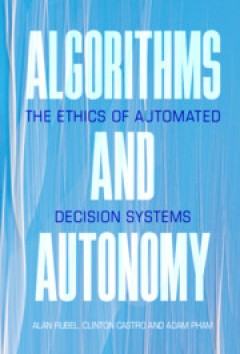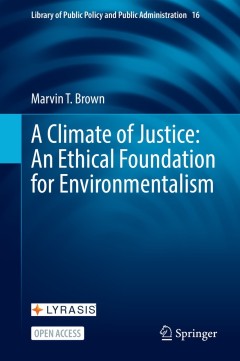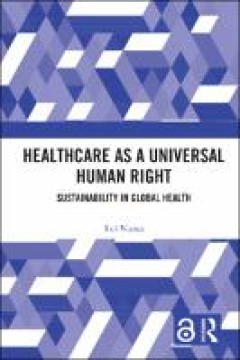Filter by

Polio Across the Iron Curtain : Hungary's Cold War with an Epidemic
By the end of the 1950s, Hungary became an unlikely leader in what we now call global health. Only three years after Soviet tanks crushed the revolution of 1956, Hungary became one of the first countries to introduce the Sabin vaccine into its national vaccination programme. This immunization campaign was built on years of scientific collaboration between East and West, in which scientists, spe…
- Edition
- -
- ISBN/ISSN
- 9781108355421
- Collation
- ix, 268 p ; ill
- Series Title
- -
- Call Number
- 616.835009439 POL D

Algorithms and Autonomy : The Ethics of Automated Decision Systems
Algorithms influence every facet of modern life: criminal justice, education, housing, entertainment, elections, social media, news feeds, work… the list goes on. Delegating important decisions to machines, however, gives rise to deep moral concerns about responsibility, transparency, freedom, fairness, and democracy. Algorithms and Autonomy connects these concerns to the core human value of …
- Edition
- -
- ISBN/ISSN
- 9781108895057
- Collation
- viii, 218 p ; ill
- Series Title
- -
- Call Number
- 174.90063 ALG A

Gender and Migration : IMISCOE Short Reader
This open access short reader offers a critical review of the debates on the transformation of migration and gendered mobilities primarily in Europe, though also engaging in wider theoretical insights. Building on empirical case studies and grounded in an analytical framework that incorporates both men and women, masculinities, sexualities and wider intersectional insights, this reader provides…
- Edition
- -
- ISBN/ISSN
- 9783030919719
- Collation
- vi, 123 p.
- Series Title
- -
- Call Number
- 304.82 GEN A

The Anglo-Scottish ballad and its imaginary contexts
This is the first book to combine contemporary debates in ballad studies with the insights of modern textual scholarship. Just like canonical literature and music, the ballad should not be seen as a uniquely authentic item inextricably tied to a documented source, but rather as an unstable structure subject to the vagaries of production, reception, and editing. Among the matters addressed are t…
- Edition
- -
- ISBN/ISSN
- David Atkinson
- Collation
- xv, 207p. ; ill.
- Series Title
- -
- Call Number
- 821.04 ATK t

A climate of justice: An ethical eoundation for environmentalism
This open access book helps readers combine history, politics, and ethics to address the most pressing problem facing the world today: environmental survival. In A Climate of Justice, Marvin Brown connects the environmental crisis to basic questions of economic, social, and racial justice. Brown shows how our current social climate maintains systemic injustices, and he uncovers resources for ch…
- Edition
- -
- ISBN/ISSN
- 9783030773632
- Collation
- xix, 185p ; ill
- Series Title
- -
- Call Number
- 179.1 BRO a

Dangerous science : science policy and risk analysis for scientists and engin…
The public is generally enthusiastic about the latest science and technology, but sometimes research threatens the physical safety or ethical norms of society. When this happens, scientists and engineers can find themselves unprepared in the midst of an intense science policy debate. In the absence of convincing evidence, technological optimists and skeptics struggle to build consensus. In thes…
- Edition
- -
- ISBN/ISSN
- 9781911529880
- Collation
- ix. ;162 p.
- Series Title
- -
- Call Number
- 501.51. DAN d

Animal death
Animal death is a complex, uncomfortable, depressing, motivating and sensitive topic. For those scholars participating in Human-Animal Studies, it is – accompanied by the concept of 'life' – the ground upon which their studies commence, whether those studies are historical, archaeological, social, philosophical, or cultural. It is a tough subject to face, but as this volume demonstrates, on…
- Edition
- -
- ISBN/ISSN
- 9781743325247
- Collation
- xv. :ill. ;351 p.
- Series Title
- -
- Call Number
- 179.3. JAY a
Curriculum and learning for climate action : toward an SDG 4.7 roadmap for sy…
Curriculum and Learning for Climate Action offers researchers, practitioners, donors, and decisionmakers insights into entry points for education systems change needed to reorient human society’s relationship with our planetary systems.; Readership: All interested in Sustainability, International Education, Environmental Education will find this book useful. This includes researchers, student…
- Edition
- Vol.5
- ISBN/ISSN
- 9789004471818
- Collation
- xxxi, 368 p.
- Series Title
- IBE on Curriculum, Learning, and Assessment, 5
- Call Number
- 333.7071 IYE c

Healthcare as a universal human right : sustainability in global health
This important book outlines how, despite varying levels of global socio-economic development, governments around the world can guarantee their citizens’ fundamental right to basic healthcare. Ground in the philosophical position that healthcare is an essential element to human dignity, the book moves beyond this theoretical principle to offer policy makers a basis for health policies based o…
- Edition
- -
- ISBN/ISSN
- 9781003241065
- Collation
- vii, 188 p. : ill.
- Series Title
- -
- Call Number
- 362.1 NUN h

Ethics for A-level
What does pleasure have to do with morality? What role, if any, should intuition have in the formation of moral theory? If something is ‘simulated’, can it be immoral? This accessible and wide-ranging textbook explores these questions and many more. Key ideas in the fields of normative ethics, metaethics and applied ethics are explained rigorously and systematically, with a vivid writing…
- Edition
- -
- ISBN/ISSN
- 9781783743902
- Collation
- 245 p. : ill.. ; 24 cm
- Series Title
- -
- Call Number
- 170.71 DIM e
 Computer Science, Information & General Works
Computer Science, Information & General Works  Philosophy & Psychology
Philosophy & Psychology  Religion
Religion  Social Sciences
Social Sciences  Language
Language  Pure Science
Pure Science  Applied Sciences
Applied Sciences  Art & Recreation
Art & Recreation  Literature
Literature  History & Geography
History & Geography